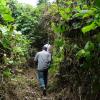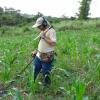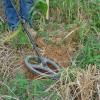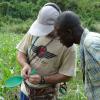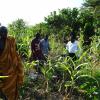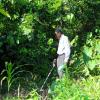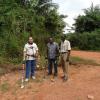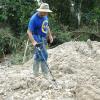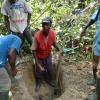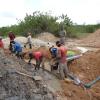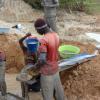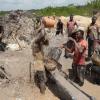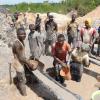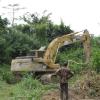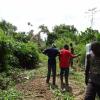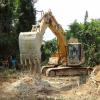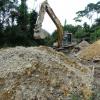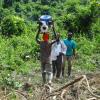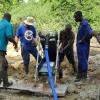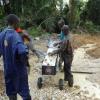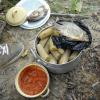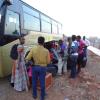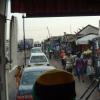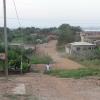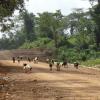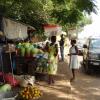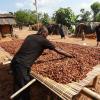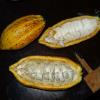

A Summary of my West African Adventure
Lucky Joe in Ghana
Did Joe Strike it Rich Searching for Gold in
Ghana? Read on and Find Out!
Detecting in Ghana
I'll answer the question at the top of the page with this statement: Now I know why some of those reality TV shows have a season 2... they don't get everything they expected in season 1! No, I did not get rich beyond my wildest dreams: in fact I did not even pay for my expenses, which is what I had set as my minimum expectation. There were a number of factors involved, not the least of which was the human factor. Getting things done in Ghana is not the same as getting things done in the U.S. There were transportations delays, equipment rental delays, days in which no work could be done in an entire region, and delays due to obtaining permissions. Weather turned out to be the least of the delay factors with only one day cut short due to a thunderstorm threatening to materialize. My experience and the people in Ghana were both wonderful. The place was really much better than my research had led me to expect. I was blessed with no mosquitoes, good food, good company, and even a little gold. I am well prepared for the way things need to be done if I choose to return some day. So we sill have to wait and see if there is a 'second season' show yet to come.
Lucky Joe
Food in Ghana
Transportation in Ghana
Prospecting Ghana Style
Prospecting AME Style
Thanksgiving Dinner in the Bush
It took the full 3 weeks of my trip to get to the point where, on the last day, I finally got to show the locals what the CC690 was capable of doing. There were a variety of reasons for this: transportation problems, equipment rental issues, permissions to be granted, and no-work days. Transportation: Many Ghanaians rely on taxis, but taxis are too expensive to take to the outlying villages. Those fortunate enough to have a vehicle at their disposal often have that vehicle in the shop for repairs. (This was the main issue for me in getting around.) The numerous pot holes and general poor condition of the roads really take a toll on the cars. Traffic in and around the main cities is heavy and takes a long time to navigate. There are also random police check points that must be dealt with. The police set these up as a type of 'extra income' method. Equipment: There is not an overabundance of heavy equipment to rent and finding an excavator at a reasonable price was not easy. I finally suggested that the chief contact one of the operators of an excavator that we saw working in the area of his village. He did that and we finally were able to get a machine out to a potential gold bearing area on Thanksgiving Day. Permission: Nothing gets done without having consent from the local chief. In every instance the chief must be consulted and to do that, first he must be found. This can involve calling him by phone, making a visit to see him in his village, or asking a villager where the chief went and when he will be back. No-work days: Every village has one day a week that they do not work and it is not the same day from village to village. They believe that something bad will happen if they violate this work taboo and do not even farm on these days. In fact, even on days when work is allowed, any work that has to do with digging in the ground must be accompanied with an offering to the ancestors: a libation (usually schnapps) is poured out onto the ground in an offering ritual.
All in all, I had a lot of days spent waiting around at the place of my lodging only to find out that for one reason or another we were not going out to the bush that day.
Ghana has what are mostly known as 'galamsey' miners. These are artisanal miners who work on a very small scale, usually by hand. On occasion they get hired by a large operator for the equivalant of $13.00/day to do the work pictured below. They are fairly skilled when it comes to digging and washing gold and are definitely a counterpart to the average American prospector who heads to the goldfields in the U.S. The main difference between Ghanaian and American prospectors is their age. I think this is due to the fact that in America, we prospect as a hobby and often as a retirement activity; whereas in Ghana, the mostly younger galamsey are doing this to make a living. The galamsey are a hard-working bunch as evidenced from their physique... not much fat to spare on these folks.
The area I travelled to in West Africa is the Ashanti region of Ghana. This area has a rich gold history dating back to ancient times and gold has been continuously mined here since those times. The Europeans first got involved in the late 1400s by trading for gold with the natives and then soon expanded that trade to include slaves, ivory and other goods. These first Europeans came from Portugal, Spain and Italy. The English got involved in the gold trade here in the mid 1500s and were soon followed by the Dutch and the Swedes. The gold that was traded for had been accumulated over a long period of time and was mined by the natives using small scale methods. The natives had little use for the gold other than for ornamentation purposes.
Due to numerous conflicts over the next few hundred years, all of the countries mentioned above abandoned their trading posts and forts, one by one, until 1872 when only the English remained. Once the British had the place to themselves, the serious European mining started. It was in 1890 that the first large mining project at the town of Obuasi was started and is still operation on a large scale today.
The British stayed until 1957 when Ghana won its independence. Currently, mining rights are granted through the government's mining ministry depending on the type of mining to be engaged in: e.g. prospecting, small scale, hard rock, etc. The reality is that even with proper permits, the local chiefs still need to grant their consent before any work can be done in their territory. And then there are also local customs to follow and traditions to respect.
A Little History
Mine at Obuasi, Ghana
Tip:
Scroll over pictures for captions. Click on pictures for larger view.
